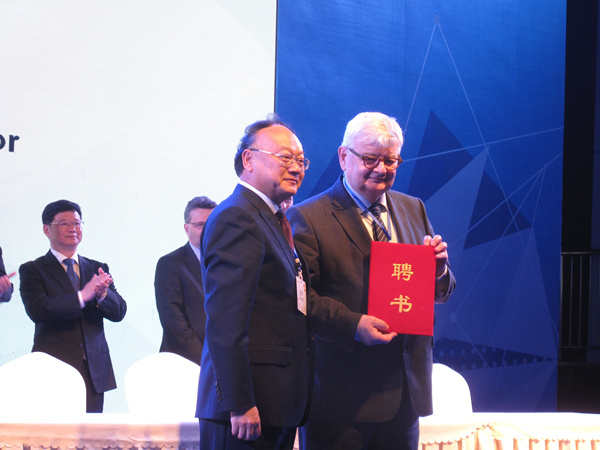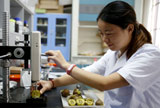Fischer promotes Germany's dual vocational education system in Sichuan
By Huang Zhiling (chinadaily.com.cn) Updated: 2016-04-15 00:56
 |
|
Joschka Fischer, former vice chancellor of Germany, shows the development strategy advisor certificate he receives from president Tang Jianhe of Sichuan Institute of Industrial Technology. [Photo by Huang Zhiling/China Daily] |
Southwest China's Sichuan province can emulate Germany's dual vocational education model to train professional personnel contributing to its real economy, said a former leading official in Germany.
Joschka Fischer, vice chancellor of Germany from 1998 to 2005, made the remarks during his visit to Sichuan.
Attending the conference "Innovative Deyang: Made in China 2025 and German Industry 4.0" held yesterday in Deyang, Sichuan, Fischer was invited to be a development strategy advisor by the Sichuan Institute of Industrial Technology.
The university is located in Deyang which is known as China's heavy equipment manufacturing base.
Fischer received the development strategy advisor certificate from the university's president Tang Jianhe and said he would promote his country's vocational education model in Sichuan.
Germany's industrial development has much to do with the support of professional personnel. Blue-collar workers in Germany are highly respected because they have propped up their country's real economy. Their income is almost the same as that for university teachers and public servants, he said.
Germany's dual vocational education system pairs hands-on learning with classroom learning to give young people a leg up in the workforce. Most students graduate not only with a degree, but also with job experience and a deep knowledge of their trade.
Fischer considered vocational education a good breakthrough point for cooperation between Sichuan and his country.
Germany has cooperated with some institutions of higher learning in Sichuan. For example, it is building the schools of Kuka robotics and automobile industry at the Sichuan Institute of Industrial Technology.
The schools will train students with Germany's dual vocation education system, making them contribute to the real economy, Fischer said.
- China's Development and China-Europe Cooperation: Sources of Positive Energy for the World
- China's finance minister addresses ratings downgrade
- Xi to Turnbull: Respect each other's core interests
- Gas suspected in dozens of eye surgery injuries
- Arrests made in Hong Kong teacher's slaying
- Belt and Road Initiative helps swell foreign student numbers
- Tomb thieves sentenced for robbing protected relics
- Trade boost eyed with Australia
- IP infringement cases often involve foreigners
- Hospital blames gas for blinding patients








